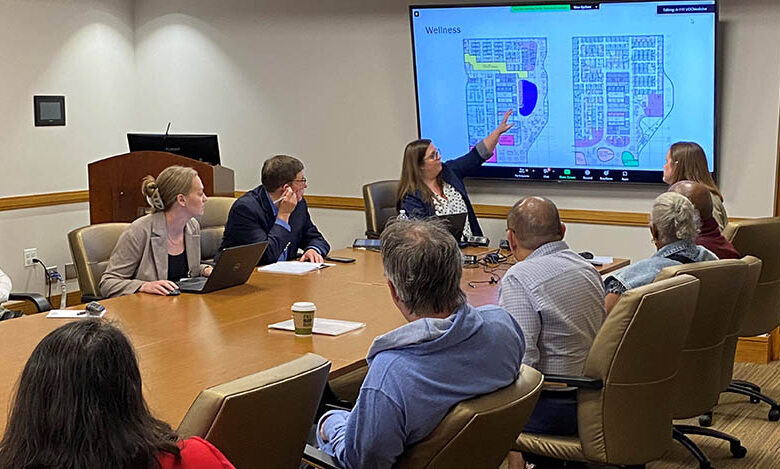Community members submit tips, recipes for success for UChicago Medicine’s new ‘teaching kitchen’

Healthy soul food recipes, accessible seating and livestreamed classes were among the ideas shared at a community forum for the University of Chicago Medicine’s new “teaching kitchen.”
The teaching kitchen will be part of a wellness-focused space on the first and second floors of the health system’s new $815 million cancer center. Pending approval from the state regulatory board June 27, the cancer center will be built on East 57th Street, between South Maryland and South Drexel avenues, and open in 2027.
The kitchen will serve as a classroom for nutrition and healthy eating courses for oncology patients and others who could benefit, including patients’ families, community members, staff and medical students.
The kitchen also will be available for community events and gatherings. UChicago Medicine sought public input on its design, as it has done throughout the cancer center planning process.
Hospital leaders envision a multifunctional space with an adjoining conference area. The goal is to evoke a homey, residential atmosphere with lots of natural light. The kitchen will be equipped with cameras so classes can be taped or broadcast live.
Community members, hospital staff, and representatives from CannonDesign, the cancer center’s architectural firm, met June 9 to review plans for the nutrition hub and view photos of teaching kitchens around the world. Participants discussed “What works?” and “What doesn’t work?” in brainstorming sessions.
Among the suggestions: accessible seating and tabletops; designated areas for people with food allergies; good ventilation for oncology patients sensitive to food odors; and tables where participants face each other — not the instructor — for a more social experience.
Certain cultures would like to learn how to eat soul food better. Sometimes the food we learn to cook in these classes may be tasty, but it might not be for us because we’re not familiar with the cuisine. Or they might not sell those ingredients in our local grocery stores.
Attendee Dale Cain, executive director of Advocates for Community Wellness Inc. in the nearby Auburn Gresham neighborhood, proposed classes with culturally sensitive recipes.
“Certain cultures would like to learn how to eat soul food better,” she said. “Sometimes the food we learn to cook in these classes may be tasty, but it might not be for us because we’re not familiar with the cuisine. Or they might not sell those ingredients in our local grocery stores.”
Other suggestions from the community included teaming with local pipeline programs to increase education about nutrition, cooking and even careers in healthcare.
Attendees agreed that it was important to have everything under one roof — including a food pantry, fresh vegetables from the hospital’s rooftop gardens, and/or a place to buy ingredients — since it can be difficult for cancer patients to travel to multiple places.
Since cancer impacts the whole family, another idea called for a teaching family- and kid-friendly kitchen that would be a supportive and communal space for them.
The Rev. Ethel Southern, of Covenant United Church of Christ in South Holland, proposed a mobile version of the teaching kitchen that could travel to patients in the Southland. Stops could include UChicago Medicine Ingalls Memorial Hospital in Harvey.
“This session was great,” Southern said. “They listened to us and they gave me a lot of ideas that I can take back and discuss with everyone.”
UChicago Medicine gastroenterologist Edwin K. McDonald IV, MD, a physician and chef who teaches many healthy-cooking classes, asked if portable cooktops that convert into grills could be deployed for healthy-grilling lessons.
He also suggested UChicago Medicine work with local vendors whenever possible and tap the expertise of James Beard Award-winning chefs in Hyde Park.
The next step is for UChicago Medicine and CannonDesign to determine which ideas it can incorporate into the project.
“We want to listen to your ideas and harvest them. We need to do a lot of work to actually execute these ideas and get resources, funding and the necessary people to deliver those services,” said Marco Capicchioni, Vice President of Facilities, Planning, Design and Construction Services for the hospital.
Besides the teaching kitchen, the cancer center’s wellness area also will include a nondenominational chapel, a retail store where wigs, cancer-related apparel and gifts are sold, and a multipurpose area. The space would be used for various patient and community education, such as:
- Patient and caregiver support groups
- Caregiver education
- Smoking cessation classes
- Stress management education
- Mindful meditation classes
- Financial education
- Group exercise and medication classes
- Survivorship groups
- Art and music therapy
- Journaling programs
- Book club




